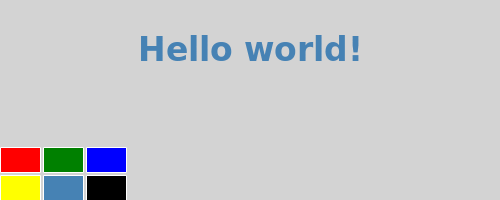QML 教程 3 - 状态和过渡¶
在本章中,我们通过引入状态和转换使这个示例变得更加动态。
我们希望文本在点击时移动到屏幕底部,旋转并变为红色。
这是QML代码:
import QtQuick Rectangle { id: page width: 320; height: 480 color: "lightgray" Text { id: helloText text: "Hello world!" y: 30 anchors.horizontalCenter: page.horizontalCenter font.pointSize: 24; font.bold: true MouseArea { id: mouseArea; anchors.fill: parent } states: State { name: "down"; when: mouseArea.pressed == true PropertyChanges { helloText { y: 160 rotation: 180 color: "red" } } } transitions: Transition { from: ""; to: "down"; reversible: true ParallelAnimation { NumberAnimation { properties: "y,rotation"; duration: 500; easing.type: Easing.InOutQuad } ColorAnimation { duration: 500 } } } } Grid { id: colorPicker x: 4; anchors.bottom: page.bottom; anchors.bottomMargin: 4 rows: 2; columns: 3; spacing: 3 Cell { cellColor: "red"; onClicked: helloText.color = cellColor } Cell { cellColor: "green"; onClicked: helloText.color = cellColor } Cell { cellColor: "blue"; onClicked: helloText.color = cellColor } Cell { cellColor: "yellow"; onClicked: helloText.color = cellColor } Cell { cellColor: "steelblue"; onClicked: helloText.color = cellColor } Cell { cellColor: "black"; onClicked: helloText.color = cellColor } } }
演练¶
states: State { name: "down"; when: mouseArea.pressed == true PropertyChanges { helloText { y: 160 rotation: 180 color: "red" } } }
首先,我们为文本类型创建一个新的down状态。当MouseArea被按下时,此状态将被激活,并在释放时被停用。
down 状态包括一组从我们的隐式 默认状态(QML 中最初定义的项目)的属性更改。具体来说,我们将文本的 y 属性设置为 160,旋转设置为 180,并将 color 设置为红色。
transitions: Transition { from: ""; to: "down"; reversible: true ParallelAnimation { NumberAnimation { properties: "y,rotation"; duration: 500; easing.type: Easing.InOutQuad } ColorAnimation { duration: 500 } } }
因为我们不希望文本立即出现在底部,而是希望它平滑移动,所以我们在两个状态之间添加了一个过渡。
from 和 to 定义了过渡将运行的状态。在这种情况下,我们希望从默认状态过渡到我们的 down 状态。
因为我们希望在从down状态切换回默认状态时运行相同的反向过渡,我们将reversible设置为true。这相当于分别编写两个过渡。
ParallelAnimation 类型确保两种类型的动画(数字和颜色)同时开始。我们也可以通过使用 SequentialAnimation 来让它们依次运行。
有关状态和转换的更多详细信息,请参阅Qt Quick States和状态和转换示例。
